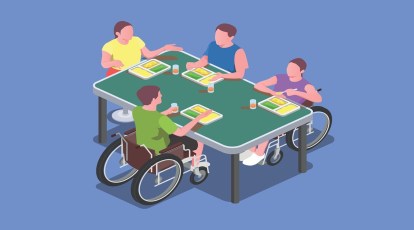Ph.D. in Disability Studies: Introduction, Admission, Registration, Eligibility, Duration, Fees, Syllabus 2024

Introduction:
In a world striving for inclusivity and equity, the field of Disability Studies stands at the forefront of social change. Pursuing a Ph.D. in Disability Studies offers an opportunity to delve deep into the complexities of disability, advocate for inclusivity, and drive meaningful societal change.
Admission Process:
- Research Proposal Submission: Applicants are required to submit a detailed research proposal outlining their intended study area within Disability Studies.
- Academic Transcripts: Transcripts showcasing academic achievements and relevant qualifications are scrutinized.
- Letters of Recommendation: Strong recommendations from academic mentors or professionals in the field hold significant weight.
- Statement of Purpose: A compelling statement outlining the applicant's motivations, aspirations, and alignment with the program's objectives.
- Interview: Shortlisted candidates may undergo interviews to assess their suitability for the program and research fit.
Eligibility:
- Educational Background: A master's degree in Disability Studies or a related field such as sociology, psychology, or education is typically required.
- Research Experience: Prior research experience, preferably in disability-related topics, is advantageous.
- Passion for Advocacy: A demonstrated commitment to advocating for the rights and inclusion of persons with disabilities.
- Analytical Skills: Strong analytical and critical thinking skills essential for conducting in-depth research.
- Language Proficiency: Proficiency in the language of instruction, often English, is mandatory.
- Personal Experience (Optional): Personal or professional experience with disability issues may strengthen the application.
Completion Time:
The completion time for a Ph.D. in Disability Studies varies depending on factors such as research complexity, funding availability, and individual progress. Typically, it ranges from four to seven years, including dissertation research and writing.
Career Opportunities:
- Academia: Opportunities to teach and conduct research in universities and colleges, contributing to the advancement of Disability Studies as a field of study.
- Policy Development: Roles in government agencies, non-profit organizations, and advocacy groups involved in shaping policies and legislation related to disability rights and inclusion.
- Community Engagement: Positions focusing on community outreach, empowerment, and capacity-building within disability communities.
- Consultancy: Consulting opportunities providing expertise on disability-related issues to organizations, businesses, and government bodies.
- International Development: Roles in international development organizations working to promote disability-inclusive practices and policies globally.
Syllabus:
- Theoretical Foundations of Disability Studies: Exploring key theories and frameworks in Disability Studies, including social model, medical model, and intersectionality.
- Disability Rights and Advocacy: Examining the history, evolution, and current state of disability rights movements and advocacy efforts.
- Qualitative and Quantitative Research Methods: Learning research methodologies and techniques for conducting empirical studies in Disability Studies.
- Intersectionality and Diversity: Analyzing the intersections of disability with other dimensions of identity, such as race, gender, sexuality, and class.
- Accessible Design and Universal Design Principles: Understanding principles of accessible design and universal design to create inclusive environments and products.
- Health and Well-being of Persons with Disabilities: Exploring health disparities, access to healthcare, and strategies for promoting well-being among persons with disabilities.
- Policy Analysis and Development: Analyzing disability policies and legislation at local, national, and international levels and exploring strategies for policy development and implementation.
Internship Opportunities:
- Non-Profit Organizations: Internship opportunities with non-profit organizations focused on disability advocacy, service provision, and community engagement.
- Government Agencies: Internships with government agencies involved in disability policy development, implementation, and enforcement.
- Research Institutes: Internship roles in research institutes conducting studies on disability-related topics, providing hands-on research experience.
- International Organizations: Internship opportunities with international organizations working on disability-inclusive development projects and initiatives.
- Corporate Sector: Internships with companies committed to disability inclusion, focusing on accessible design, diversity and inclusion initiatives, and corporate social responsibility programs.
Scholarships and Grants:
- Disability-Specific Scholarships: Scholarships specifically designed for students with disabilities pursuing higher education in Disability Studies or related fields.
- Research Grants: Funding opportunities through research grants provided by government agencies, foundations, or non-profit organizations supporting disability research.
- Merit-Based Scholarships: Scholarships awarded based on academic merit and achievements in Disability Studies or related fields.
- Diversity and Inclusion Scholarships: Scholarships aimed at promoting diversity and inclusion, including disability inclusion, within academic institutions.
- Teaching Assistantships: Some institutions offer teaching assistantships providing financial support to Ph.D. students in exchange for teaching responsibilities.
FAQs:
Can I pursue a Ph.D. in Disability Studies without prior experience or personal connection to disability issues?
While prior experience or personal connection to disability issues is beneficial, it is not always a requirement. Many programs value diversity and welcome students with a passion for advocacy and social change.
Are there opportunities for interdisciplinary research within Disability Studies?
Yes, Disability Studies often intersects with various fields such as sociology, psychology, public health, education, and law, offering ample opportunities for interdisciplinary research.
How can I ensure that the institution offering the Ph.D. program in Disability Studies is disability-inclusive?
Look for institutions with a demonstrated commitment to disability inclusion, such as accessible campus facilities, disability services offices, and inclusive policies and practices.
What types of dissertation topics are suitable for a Ph.D. in Disability Studies?
Dissertation topics can vary widely and may include areas such as disability rights, accessibility, inclusive education, healthcare disparities, assistive technology, and disability culture.
How can I contribute to the advancement of Disability Studies beyond academia?
Beyond academia, there are numerous opportunities to contribute to the advancement of Disability Studies through advocacy, activism, community engagement, policy work, and collaboration with disability organizations and communities.





